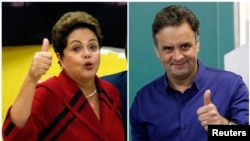Long-term foreign investors are growing more optimistic about Brazil no matter who wins this month's presidential election but they say an opposition victory could unleash a flood of new money.
The tight and fast-changing election campaign has sent Brazil's financial markets on a wild ride with big gains whenever leftist President Dilma Rousseff loses ground in polls and slides whenever her re-election bid seems stronger.
Rousseff's economic policies have been roundly criticized by investors for tipping Brazil into a recession while damaging state-run companies such as oil producer Petrobras and lender Banco do Brasil along the way.
Her business-friendly opposition rival Aecio Neves has promised stronger fiscal control and less government intervention in state firms if he is elected, winning the support of most market players.
Beyond the swings of a neck-and-neck race, however, long-term sentiment on Brazil has improved.
Investors are betting that either Neves will win the runoff on Oct. 26 or that Rousseff, chided by a very narrow margin of victory, will adopt more market-friendly policies in a second term.
"Either things are significantly better, or a little bit better," said Jorge Mariscal, chief investment officer for emerging markets at UBS Wealth Management, which oversees about $1 trillion in investments.
After hitting a five-year low in mid-March, the benchmark Bovespa stock index has since gained more than 20 percent and is up over 5 percent in 2014 - by far the best performer among key Latin American bourses.
Global funds that invest in Brazilian equities also began to attract net inflows in April. Since then, they have received over $4 billion, more than enough to offset the $3.5 billion in net redemptions recorded during the first quarter of the year, according to data from EFPR Global.
That number could shoot much higher if Neves wins.
"After we get the final results, then we would definitely look to increase Brazil in our portfolio," said Ben Rozin, who helps manage more than $53 billion at Rochester, New York-based Manning & Napier, Inc.
Echoing other long-term investors, Rozin said it "pays to wait and see how things play out" but noted that a Neves victory would sharply improve the value of state-run companies that have suffered under Rousseff's heavy hand.
"Even knowing that the market would be more expensive then, to us the economic and the earnings trajectory would change significantly for the better," he said.
Manning & Napier had been tip-toeing back into the Brazilian market since the second quarter of 2013. The firm's World Opportunities Series fund and its International Series fund both had a little over 6 percent of their holdings in Brazilian shares by the end of August, up from about 2.4 percent and 4 percent, respectively, at the end of March, 2013.
Pragmatic Rousseff?
Since August, when the death of presidential candidate Eduardo Campos in a plane crash upended the election race, investing in Brazil's stock market has been akin to riding a bucking bull, with sharp drops and jumps dictated by voter opinion polls.
Though traders expect the market to sell off heavily in the short term if Rousseff is re-elected, long-term investors aren't preparing to run for the hills. The odds of a more open-minded Rousseff administration, they argue, increased after the strong showing of opposition parties in the election's first round.
"This could force some change on the part of the Rousseff administration towards being more pragmatic on things like prices, fiscal policy, changes in the cabinet," said UBS' Mariscal. "She will be more forced to address the key failures of the economic model that she has been following."
While these investors do not expect a second Rousseff government to foster a strong economic recovery, they believe she could implement some badly-needed policy adjustments to rein in inflation and win back some credibility among investors and credit ratings agencies.
Even those who are unconvinced that the president would change tack in a second term say Brazil will continue to offer interesting growth opportunities regardless.
"I wouldn't expect a real substantive change in how she is running the economy," said Marco Spinar, an associate portfolio manager on Neuberger Berman's $5.5 billion Global Emerging Market Fund, which has about 10 percent of its portfolio invested in Brazil.
Still, Spinar sees opportunities in sectors that have underperformed recently, such as capital goods manufacturers and businesses geared toward investment spending.
"Brazil obviously isn't going to fall apart if Dilma wins," he said.
